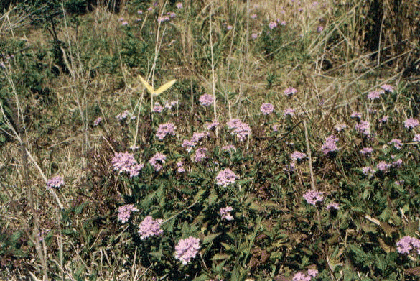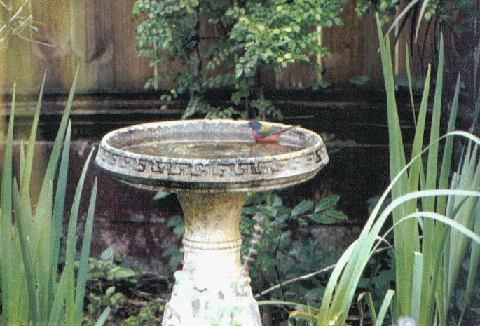Life Begins When You Plant A Garden
Chinese Proverb
 Native
plant gardening is the use of plants best adapted to the conditions where we
live. Cold and drought-tolerant, pest and disease resistant, native trees,
shrubs, and groundcovers require little time spent on maintenance once
established. Native plants invite a wide variety of exciting wildlife, including
songbirds, hummingbirds, and colorful butterflies, replenishing delicate
ecosystems and greatly enhancing the landscape and our lives.
Native
plant gardening is the use of plants best adapted to the conditions where we
live. Cold and drought-tolerant, pest and disease resistant, native trees,
shrubs, and groundcovers require little time spent on maintenance once
established. Native plants invite a wide variety of exciting wildlife, including
songbirds, hummingbirds, and colorful butterflies, replenishing delicate
ecosystems and greatly enhancing the landscape and our lives.
Imagine natural borders and sunny, flowering gardens.
Property lines and fences present exciting areas to utilize landscape shrubs,
establishing privacy and a lasting connection with nature.
The first step is easy! Put away your power tools, turn
off your automatic sprinkler system, resist raking leaves, forget replanting sod
and discontinue spraying and fertilizing with chemicals. Remove unhealthy
plants.
If a mowed lawn is desired for children and pets
designate an area but note: turf grass is the #1 consumer of water and chemicals
in the suburban landscape. Flags may be used to designate areas where turf grass
may be eliminated and gardens planted.
A layer of mulch (oak leaves or pine needles) will help
retain moisture and discourage grass in beds and borders. Keep mulch three
inches away from stems and trunks. Free mulch is available at the Cocoa Beach
Freedom Seven Center, 400 4th St. South, 784-2313. Cypress mulch is
not recommended. Its sale encourages the continued destruction of Florida’s
grand cypress swamps.
 Songbirds
love to drink and bathe in fresh water. A large terra cotta saucer, pedestal
birdbath, or small water garden will attract birds and wildlife.
Songbirds
love to drink and bathe in fresh water. A large terra cotta saucer, pedestal
birdbath, or small water garden will attract birds and wildlife.
Less than 1% of all insects are harmful to plants.
Identify and appreciate beneficial pollinating and predator insects, their
larvae and caterpillars.
Please do not use chemical insecticides, herbicides or
fertilizers! Native plants invite delicate wildlife, all of which would undergo
painful secondary poisoning. Many common "weeds" are host plants for
butterflies, and their attractive flowers offer nectar for pollinating insects.
Before you "weed" and unknown plant wait to
see it bloom. You may decide to keep it for the flowers.
Dead trees, limbs and fronds are an important food
source and habitat for wildlife. Consider keeping them.
It is important to acknowledge whether the plants you
select require sun of shade and establish them in the soil conditions they like.
When planting allow trees and shrubs room to mature so constant pruning is
unnecessary.
Have fun and enjoy the endless rewards and ease of
landscaping with nature.
 Native
plant gardening is the use of plants best adapted to the conditions where we
live. Cold and drought-tolerant, pest and disease resistant, native trees,
shrubs, and groundcovers require little time spent on maintenance once
established. Native plants invite a wide variety of exciting wildlife, including
songbirds, hummingbirds, and colorful butterflies, replenishing delicate
ecosystems and greatly enhancing the landscape and our lives.
Native
plant gardening is the use of plants best adapted to the conditions where we
live. Cold and drought-tolerant, pest and disease resistant, native trees,
shrubs, and groundcovers require little time spent on maintenance once
established. Native plants invite a wide variety of exciting wildlife, including
songbirds, hummingbirds, and colorful butterflies, replenishing delicate
ecosystems and greatly enhancing the landscape and our lives. Songbirds
love to drink and bathe in fresh water. A large terra cotta saucer, pedestal
birdbath, or small water garden will attract birds and wildlife.
Songbirds
love to drink and bathe in fresh water. A large terra cotta saucer, pedestal
birdbath, or small water garden will attract birds and wildlife.